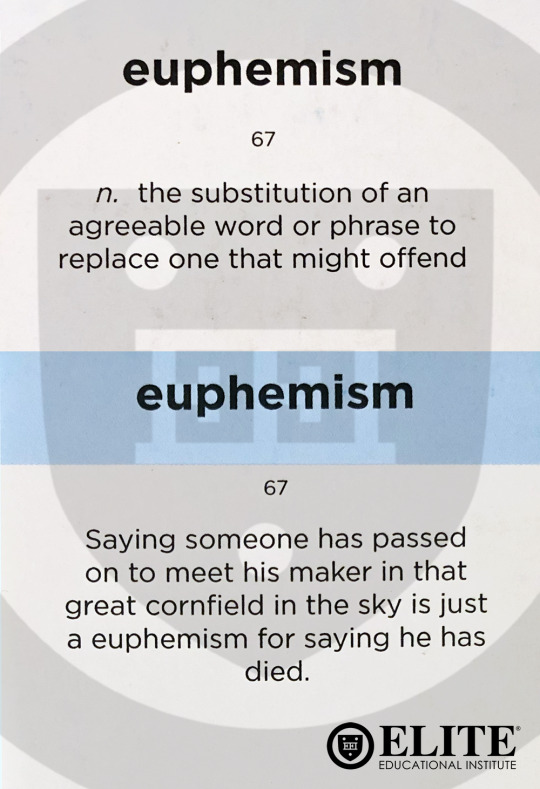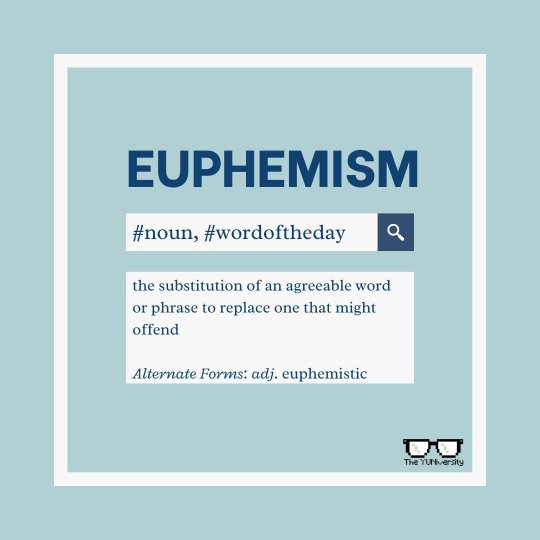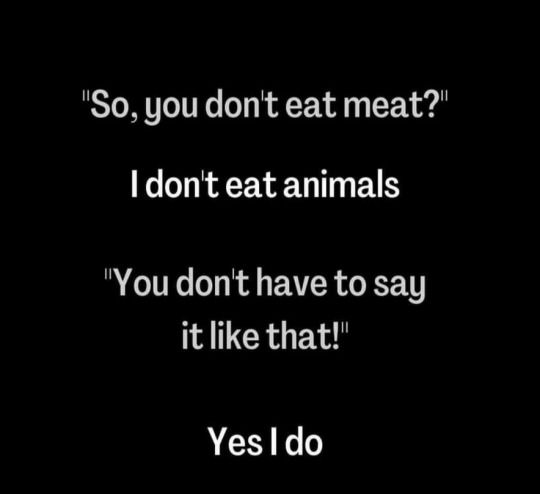#(euphemism)
Text
"Licking the sand" was a euphemism for doing the dirty work/something no one else wanted to do. I said, "Well, someone had to lick the sand," as I was murdering my boss.
#dream#there was a lot more that happened but idk how to begin to explain if#euphemism#murder tw#death tw
2K notes
·
View notes
Text

For example,
Henry often uses the euphemism “let go” instead of saying that someone was “fired” or “terminated.”

Website | Twitter | Instagram | Medium | Pinterest | Ko-fi | eBook
18 notes
·
View notes
Text
I think I hate being autistic more than I realised.
I'm a huge fnaf nerd so I'm going to use a robot euphemism to explain.
I feel like I'm a robot, watching through eyes that are not my own, thinking in patterns and learning off others, moving in programmed ways. But I'm broken.
Something went wrong in the early development stages. A piece of code written wrong, a critical error. And the older I get, the more I'm used, the more obvious it is, cracks start to show. The error made clearer.
I can go to as many technicians as I want, different maintenance people. All specialising in their own area. Tell them what's wrong. Let them run their diagnostic tests. But the problem is so deeply engrained in me. Formed from the very start, from that first error. And everything has gone wrong, gotten worse since then.
I will never be fixed.
I will always twitch, limbs and other parts glitching, malfunctioning. I will always copy the way other robots behave, trying to make up for my own flaws. I will always think, try and connect the patterns and make sense of it, try to be the AI I was intended. But that first error, that critical flaw in my coding, it will always break me. My wiring will never be right, my circuits always fried, my shell broken, twisted, my AI damaged. And no technician or specialist will ever be able to change that, change me.
Forever a broken robot.
#autism#robot#poetry#euphemism#rant?#fnaf#actually autistic#autistic experiences#autism is a disability#disabled
15 notes
·
View notes
Text
A lot of people are talking about the little details in Good Omens 2, but how has no one mentioned what Ms Cheng is doing with her hands when she and Mrs Sandwich are having the seamstress conversation?
10 notes
·
View notes
Text
Came across this article and couldn’t help snickering:
“We’ve all heard ‘shark week’ and ‘Aunt Flo’s in town’, but here are a few others that are incredibly creative:
Red Army (Красная армия)
Language: Russian
The painters are in
Language: English
Granny’s stuck in traffic
Source: South Africa
I have a flood (Ho le inondazioni)
Language: Italian
Strawberry Week (Erdbeerwoche)
Language: German
There are communists in the funhouse (Der er kommunister i lysthuset)
Language: Danish
The motherland is bleeding
Source: Turkey
The rooster sang to you yesterday
Source: Puerto Rico
Satan's waterfall
Language: English
Defrosting the steak (Descongelar el Bistec)
Language: Russian
Blood Festival (血祭り)
Language: Japanese
Santa Claus has come
Source: Romania
The red Ferrari is here
Source: Netherlands
Monthly oil change
Source: Hungary
The day of pushing flowers (Kukintapäivä)
Language: Finnish
Arrival of Matthew Perry (ペリー来航)
Language: Japanese”
#what a wild ride#some are visual#some are visceral#some are surprisingly political#the last one really got me#period mention#menstrualawareness#menstrual period#menstruation#euphemism#euphemisms#around the world#international#global#italian language#english language#russian language#south african#german language#turkish language#danish#puerto rican#japanese language#romanian language#hungarian language#dutch language#finnish language#funny#lol#matthew perry
67 notes
·
View notes
Text

The Back Door Cafe - Because Back Door Guests are best
#geoguessr#the back door cafe#back door#euphemism#double entendre#united states#american#the south#cafe#things i found on geoguessr#hey look I'm a spooky american ghost
3 notes
·
View notes
Note
English linguistic question!

I am entirely stomped.
What does it mean? I even asked a UK native English speaker, and they also only had 🤔 to say. Best idea they had was that "outside the fence" means something not normal?
Googling also didn't yield anything that seemed outrageous enough to warrant such a reaction. (It's probably not Australia/New Zealand's "Beyond settled country." meaning?)
??????
Sure thing
happy ending = orgasum (usually male)
happy endings, however, these days specifically is connected to (now, and in certain swaths of the USA)
a massage place that employs sex workers who will give a man a hand job as part of the service
as in "is that the kind of place where a dude can get a happy ending?"
to make matters worse, in many places in the USA this concept (sex worker + massage parlour) is specifically associated with Asian masseuse
and yes, that both misogyny and prejudice.
So
A Happy Ending Behind The Fence
Basically is just another way of saying:
Jacking It Behind the Fence
it's pretty abruptly visual... shall we say?
A bit in your face?
or not.
because that would be in your hand...
now wouldn't it?
40 notes
·
View notes
Text

4 notes
·
View notes
Text

NPR: “The issue of abortion has become an issue for the GOP.”
Let’s drop “issue” as a euphemism for “problem.” For one thing, see above -- it’s cruel and unusual to make one word mean both “topic” and “trouble.” For another, the words you least want to euphemize are those that alert you to danger. You might let someone with mental issues take care of your cats, but would never trust them to someone with mental problems.
3 notes
·
View notes
Text
Great Scott! (Scott who?)

In the “Back to the Future” movie trilogy, Doc Brown exclaims, “Great Scott!” a total of 15 times. “Great Scott!” was also a favorite expression of comic book heroes like Superman and Batman. But the question arises, “Scott who?”
You guessed it: “Great Scott” is the Word (or Phrase) of the Day.
Now, before we get into specific Scotts – one of whom was an actual Scot – let’s get this out of the way: “Great Scott!” an exclamation of amazement or dismay, is what is known as a “minced oath,” a euphemism in which a blasphemous, taboo or profane word is replaced in a phrase. In the case of Great Scott, the Oxford English Dictionary says the word being replaced is “God.”
But why Scott? And Scott who?
A few people…a small minority, really…suggest we’re talking about the author Sir Walter Scott, born in Edinburgh, so an actual Scotsman. He was referred to in several poems as the Great Scott. Mark Twain, we’re told, was not a fan. In “Huckleberry Finn” he named a boat that was sinking the Walter Scott.
The more generally accepted theory is that the Great Scott in question was Old Fuss and Feathers himself, General Winfield Scott. He was a celebrated leader of U.S. troops in the Mexican American War and commanding general of the Union forces at the start of the Civil War. Many of the men under his command thought Scott was pretty great. He was certainly great in stature. He stood about six-foot-five and weighed 300 pounds (and at one point late in his career, was too fat to ride a horse). His men swore by him…and eventually took his name as a mild swear word.
Now, about Great Caesar’s Ghost……
#word of the day#words#language#humor#great scott#back to the future#doc brown#civil war#euphemism#sir walter scott
2 notes
·
View notes
Text

For example,
Henry often uses the euphemism “let go” instead of saying that someone was “fired” or “terminated.”

Website | Twitter | Instagram | Medium | Pinterest | Ko-fi | eBook
11 notes
·
View notes
Text

It doesn't make sense that Cinderella had a different shoe size than any other bitch in the village.
#Cinderella#theshoefits#differentsizes#doesntmakesense#juicyslipper#sizematters#euphemism#fairytales#illogical#acrylic#artoftheday#dailyartwork#flomm#artwork#flommist#kunst#lowbrowart#outsiderart#painting#beercoaster#beermat#bierdeckel#handpaintedbeercoaster#perspective
2 notes
·
View notes
Text
Breaking the Code: A Guide to Spotting and Avoiding Coded Language in Everyday Communication

I have observed that coded language is being used more and more in our everyday communication. Coded language refers to the use of words or phrases that have hidden meanings or connotations that are not immediately apparent to the listener or reader. It can be used to manipulate, deceive, or exclude people, and is often used by the media and politicians to shape public opinion. In this article, I will explore the different types of coded language and how to spot and avoid them.
Understanding the Different Types of Coded Language
Dog Whistles
Dog whistles are words or phrases that have a hidden meaning that is only understood by a particular group of people. They are often used to appeal to people's prejudices or beliefs without overtly stating them. For example, the phrase "law and order" is often used as a dog whistle to appeal to people's fears of crime and violence.
Euphemism
Euphemisms are words or phrases that are used to soften the impact of a harsh reality. They are often used in situations where the truth may be too difficult or uncomfortable to convey directly. For example, the phrase "passed away" is often used as a euphemism for "died".
Framing
Framing refers to the way in which information is presented to influence the way people think about a particular issue. It can be used to shape public opinion by highlighting certain aspects of a story while downplaying or ignoring others. For example, the media may frame a story about immigration in terms of national security rather than the human cost.
Gaslighting
Gaslighting is a form of psychological manipulation in which the person doing the gaslighting makes the victim doubt their own perception of reality. It is often used to discredit or undermine people who are critical of a particular viewpoint or ideology.
Jargon
Jargon refers to technical language that is used within a particular industry or profession. It can be used to exclude people who are not familiar with the terminology and can be used to create a sense of superiority or expertise.
Loaded Language
Loaded language is language that is designed to elicit an emotional response from the listener or reader. It is often used to shape public opinion by appealing to people's fears, prejudices, or beliefs. For example, the phrase "tax relief" is often used as loaded language to appeal to people's desire for lower taxes.
Semiotics
Semiotics refers to the study of signs and symbols and how they are used to convey meaning. It can be used to manipulate people's perceptions by using symbols or images that are associated with particular ideas or emotions.
Slang
Slang is informal language that is often associated with a particular group or subculture. It can be used to exclude people who are not familiar with the terminology and can be used to create a sense of belonging or identity.
Spin
Spin refers to the way in which information is presented in order to shape public opinion. It can be used to create a positive or negative impression of a particular person, organization, or idea.
Stereotyping
Stereotyping refers to the practice of making assumptions about people based on their race, gender, age, or other characteristics. It can be used to exclude or discriminate against people who do not fit into a particular group or category.
Whataboutism
Whataboutism is a form of deflection in which the person doing the whataboutism deflects criticism by pointing out the flaws or mistakes of others. It is often used to avoid taking responsibility for one's own actions or to discredit others who are critical of a particular viewpoint or ideology.
The Impact of Coded Language on Communication
Coded language can have a significant impact on communication by shaping people's perceptions, excluding or discriminating against certain groups, and manipulating people's emotions. It can be used to create a sense of belonging or identity for some people, while excluding or marginalizing others. It can also be used to shape public opinion and influence political and social outcomes.
Examples of Coded Language in Everyday Communication
Examples of coded language can be found in a wide range of contexts, from political speeches to everyday conversations. Here are some examples:
"Illegal alien" - a term used to describe undocumented immigrants that dehumanizes and criminalizes them
"Urban" - a euphemism for black or non-white communities
"Fake news" - a term used to dismiss or discredit news that does not support a particular viewpoint or ideology
"Welfare queen" - a stereotype that portrays black women as lazy and welfare-dependent
"Family values" - a loaded term used to appeal to people's beliefs about traditional gender roles and sexual morality
How to Spot Coded Language
Spotting coded language requires careful attention to the words and phrases being used and an understanding of their hidden meanings and connotations. Here are some strategies for spotting coded language:
Pay attention to the context in which the words or phrases are being used
Look for patterns in the language being used
Be aware of your own biases and assumptions
Consider the source of the language being used and their motivations
The Dangers of Falling for Coded Language
Falling for coded language can have serious consequences, both for individuals and society as a whole. It can lead to the exclusion or marginalization of certain groups, the manipulation of public opinion, and the perpetuation of harmful stereotypes and prejudices. It can also contribute to a climate of fear and mistrust.
Strategies for Avoiding and Countering Coded Language
Avoiding and countering coded language requires a combination of awareness, critical thinking, and effective communication. Here are some strategies for avoiding and countering coded language:
Educate yourself about the different types of coded language
Be aware of your own biases and assumptions
Question the language being used and ask for clarification if necessary
Use language that is clear, direct, and inclusive
Speak out against coded language when you encounter it
The Role of Media in Perpetuating Coded Language
The media plays a significant role in perpetuating coded language by shaping public opinion and reinforcing stereotypes and prejudices. It is important to be aware of the ways in which the media uses coded language and to speak out against it when necessary.
Conclusion and Call to Action
In conclusion, coded language is a pervasive and powerful tool that can be used to shape public opinion, exclude certain groups, and perpetuate harmful stereotypes and prejudices. By understanding the different types of coded language and how to spot and avoid them, we can become more effective communicators and advocates for social justice. It is up to all of us to speak out against coded language and to work towards a more inclusive and equitable society.
#CodedLanguage#HiddenMeanings#CommunicationManipulation#DogWhistles#Euphemism#Framing#Gaslighting#Jargon#LoadedLanguage#Semiotics#Slang#Spin#Stereotyping#Whataboutism#MediaInfluence#SpottingCodedLanguage#InclusiveCommunication#SocialJustice
5 notes
·
View notes
Quote
ingested into the engine
national transportation safety boardsani
#euphemism#the sugar coat#airline ground crew#and the sanitization of death#we are saddened to hear about the tragic loss of a team member...
2 notes
·
View notes

